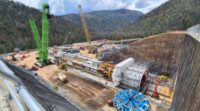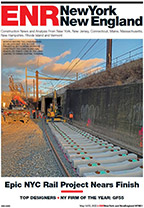The reprieve for a major new commuter rail tunnel under the Hudson River, once set to be the largest public works project in the U.S., never arrived.
Proponents of the megaproject, estimated at $8.7 billion, failed to convince New Jersey Gov. Christopher Christie (R) that the state would not have to make up cost overruns that some claimed would boost the total price of the project to $13.7 billion.
“In the end, my decision is not changed,” Christie said. “I cannot place upon the citizens of the State of New Jersey an open-ended letter of credit.”
Christie emphasized his objection to paying for costs not covered by $6 billion in funds from the Federal Transit Administration and the Port Authority of New York and New Jersey.
“What the proponents of this plan are asking me to do, on behalf of citizens of this state, is to hand them over a blank check. I simply will not do that to the people of the State of New Jersey.”
According to observers and published reports, Christie may seek to use New Jersey’s existing $2.7-billion project commitment to shore up its depleted transportation trust fund for bridge and highway repair. Not clear is how FTA will reassign its $3 billion earmark to other rail projects in the U.S., or how Port Authority will reallocate its share.
Others have suggested the money is likely to be spent on upgrading New Jersey’s roads.
One official of the project, known as Access to the Region’s Core (ARC), contends that projected cost figures submitted by FTA were higher than those developed by the project. Also added to the project’s total cost by Christie was work on a rail bridge in New Jersey that was set to be paid by New Jersey Transit, a project owner and the Federal Railroad Administration, says the official, who declined to be identified as an unauthorized project spokesman.
New Jersey Transit did not respond in time to questions about contractor demobilization, but one contractor, which declined to be identified, says the firm had not yet finalized demobilization plans because it had not yet received formal, legal notice that the project is cancelled.
“However, our teams had only begun about 10% of the work related to our portion of the contract, so the demobilization effort should not be as extensive as it would have been if the entire operation were in full swing,” the company said.
Efforts were under way to pursue possible private-finance schemes for ARC. In an Oct. 22 letter, Robert S. Peckar, a construction attorney with offices in New York and New Jersey, noted the existence of “international companies ready, willing and able to participate in a procurement process to finance, build and manage the completion of the project” that are among the firm’s clients. They include ACS Infrastructure Development Inc., Hochtief P3Solutions, Skanska Infrastructure Development Inc. and Meridian Group. "
Peckar notes that the state would first have to adopt legislation “to make this approach possible.”
"But again, the citizens, the taxpayers, the riders, would have to come up with a way to pay this private entity through additional fees and costs to be able to make that a viable alternative," says Christie.
Meanwhile, the ARC official notes that the project’s current staff of 300 engineers, planners and architects will be losing their jobs, if not reassigned elsewhere by their consulting firm employers. “There will be lots of engineers looking for jobs in the New York region,” he says
Many area projects are approaching completion or facing delays.






